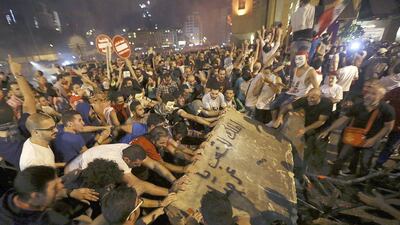BEIRUT // It has become a familiar scene in downtown Beirut: protesters battle police at barricades, chucking stones at riot officers and running from tear gas, water cannon, batons and – occasionally – rubber bullets.
Hundreds have been injured and dozens arrested since protests first broke out in July. Initially sparked by the government’s failure to solve a rubbish collection crisis, they have since evolved into a broader fight against a lack of basic public services, corruption and the sectarian nature of the Lebanese state.
But though the protests show no sign of stopping, and public anger continues to grow, the country’s sectarian political system – where major parties are largely led by former warlords and political allegiance is often determined by religion – may prove to be an impassable obstacle.
“The problem of the Lebanese state is that it does not provide its citizens with rights. In order for citizens to get anything – even basic services – they have to go to sectarian leaders,” said Lina Khatib, a senior research associate at the Paris-based Arab Reform Initiative.
She said this in turn “sustains the political power of those sectarian leaders and ensures that the political status quo is never really reformed”.
Lebanon remains a country where parties and leaders largely fight for benefits for their own sectarian groups – not the nation as a whole. And despite rhetoric about dialogue, coming together and building a strong nation, few sectarian political leaders – called the “zuama” in Arabic – are believed to really want change.
Sectarianism is so built into the fabric of Lebanon’s politics that by an unwritten 1943 pact, the country’s president will always be Christian, the prime minister Sunni and the speaker of parliament Shiite.
Analysts say the first step to creating a successful, nonsectarian civil society movement in Lebanon is to break the dependency of citizens on established political parties.
“Sectarian loyalty pretty much prevents the formation of a cohesive national movement from becoming widespread,” said Imad Salamey, a political science professor at the Lebanese American University in Beirut.
Ramez Dagher, a blogger on Lebanese politics, says the biggest challenge facing You Stink – the main group behind the latest protests – or any similar movement is “to convince the Lebanese that their interests as Lebanese citizens are more important than their interests as a political party [or as] sectarian supporters”.
But, Mr Dagher said, the government’s most recent failures have helped to break down people’s complacency about the intersection of the state and sectarian political parties.
“The government’s inactivity and severe lack of basic services – no water, no electricity, slow internet, horrible infrastructure and rubbish piling up in front of homes – is currently eroding an illusion that the system profits the people,” he said.
And the government, despite repeatedly saying that it will find a solution to the rubbish crisis – as well as address other concerns, such as police brutality and corruption – does not appear to be taking the protesters seriously in terms of taking concrete action, said Ms Khatib.
While the government has failed to find an alternative disposal site for rubbish after Lebanon’s largest landfill shut down on July 17, the ministers who protesters have called on to resign remain in office.
Ms Khatib said the government does see the protest movement as “an existential threat to the status quo”, but rather than responding with political reform, it was instead “reacting through cracking down”.
Another major obstacle facing the protesters is manpower: while many Lebanese are cheering the protests on from home, few are willing to go out on to the streets themselves.
“People watch TV and see tear gas, police brutality, protesters hosed down with water cannons, violence and oppression,” said Mr Dagher. “Independent moderate Lebanese have adapted to the humiliating circumstances they live in and aren’t ready to take the extra mile of participating in a protest and risk being targeted and bullied by the state or its bigoted partisans.”
On several occasions, men claiming to be supporters of Nabih Berri – Lebanon’s speaker of parliament and head of the Shiite Amal party – attacked protesters who held derogatory signs about the former warlord and shouted slogans against him.
But Faysal Itani, a resident fellow at the Atlantic Council’s Rafik Hariri Centre for the Middle East, said citizens were not just fearful of violence, but also sceptical that they could make a difference.
“There are not really any means of securing your interests in Lebanon without the ‘regime’, that is, the sectarian client-patron systems,” he said. “Citizens know this, and while they don’t like the regime either, they simply don’t have any better, practical, implementable alternatives, so they are paralysed by their situation.”
Other Lebanese see the protesters as striking out at the wrong target, and attacking the only somewhat legitimate institutions in the country.
Many who are strongly opposed to sectarianism “are thirsty to have a functioning, centralised state authority and institutions that have power,” said Mr Salamey. “So that’s why when the protesters throw stones to confront police, many people come to resent this.”
However, “the difference between Lebanon and other countries [such as Tunisia, Egypt and Syria] when confronted by civil protest movements ... is that the political power is not centralised”, Mr Salamey added.
“Rather it is decentralised among various sectarian chiefs. And this makes the effort for protesters much more difficult: they have too many parties to fight instead of just one.”
foreign.desk@thenational.ae

